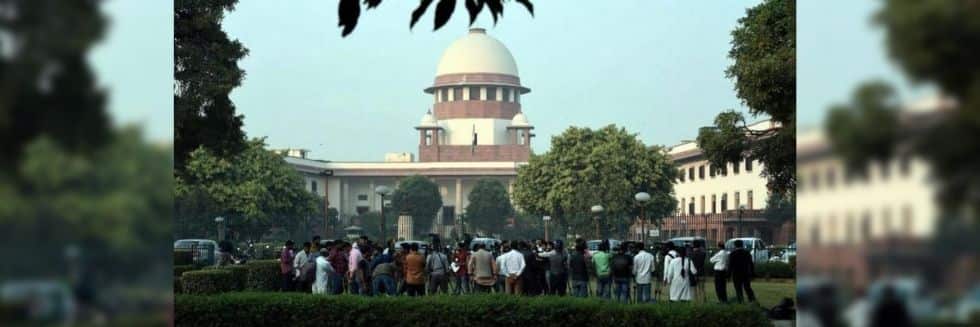In a landmark judgment, Supreme Court has held that all women are entitled to safe and legal abortion up to 24 weeks of their pregnancy under the Medical Termination of Pregnancy Act,1971.
The bench comprising Justice D.Y. Chandrachud, Justice J.B. Pardiwala and Justice A.S. Bopanna was addressing and interpreting the MTP Act when it comes to medical termination of pregnancy in the case of unmarried women.
The bench considered the distinction between married and unmarried women “artificial and constitutionally unsustainable” and held that it perpetuates the stereotype that only married women are sexually active.
The bench was examining whether the exclusion of unmarried women, who got pregnant in a consensual relationship, from Rule 3B of the Medical Termination of Pregnancy Rules is valid. Rule 3B of the MTP Rules enlists the categories under which woman
“If Rule 3B(c) is understood as only for married women, it would perpetuate the stereotype that only married women indulge in sexual activities. This is not constitutionally sustainable. The artificial distinction between married and unmarried women cannot be sustained. Women must have autonomy to have free exercise of these rights,” Justice Chandrachud said.
“The rights of reproductive autonomy give an unmarried woman similar rights as a married woman,” the bench stated while noting that the aim of Rule 3B of the MTP Act is to allow women to undergo abortion after 20-24 weeks. Therefore, the discrimination to include married women and excluding unmarried women will be violative of Article 14 of the Indian Constitution.
The bench noted that the foetus relies on the woman’s body to sustain. Therefore, the decision to terminate is firmly rooted in their right to bodily autonomy. If the State forces a woman to carry an unwanted pregnancy to the full term, it will amount to an affront to her dignity, the top court added.
The bench went on to add, “The law should not decide the beneficiaries of a statute based on narrow patriarchal principles about what constitutes permissible sex. This would create invidious classifications.”
While noting that reproductive rights of women included a “constellation of rights, entitlements and freedoms for women”, Justice Chandrachud added, “Reproductive rights include the right to access education and information about contraception and sexual health. The right to decide whether or what type of contraceptives to use. The right to choose whether or when to have children. The right to choose the number of children. The right to choose safe and legal abortion. The right to reproductive health care… Women must also have the autonomy to make decisions on these rights, free from coercion or violence.”
A woman who can abort a child up to 24 weeks in India under Rule 3B of the MTP Act
(a) survivors of sexual assault or rape or incest;
(b) minors;
(c) change of marital status during the ongoing pregnancy (widowhood and divorce);
(d) women with physical disabilities [major disability as per criteria laid down under the Rights of Persons with Disabilities Act, 2016 (49 of 2016)];
(e) mentally ill women including mental retardation;
(f) the foetal malformation that has substantial risk of being incompatible with life or if the child is born it may suffer from such physical or mental abnormalities to be seriously handicapped; and
(g) women with pregnancy in humanitarian settings or disaster or emergency situations as may be declared by the Government.
These rules were added to the 1971 MTP Act through 2021 amendment which raised the time limit for the termination of pregnancy.
Married Woman’s Forceful Pregnancy Can BE Treated As Marital Rape: SC
Forceful pregnancy of a married woman can be treated as “marital rape” for the purpose of abortion, the bench said.
Justice Chandrachud stated, “Married women may also form part of class of survivors. Rape means sexual intercourse without consent and intimate partner violence is a reality. In this case, also woman may get forcefully pregnant.”
The bench noted that the definition of rape must include marital rape under the Medical Termination of Pregnancy Act.
The apex court added, “The misconception that strangers are exclusively or almost exclusively responsible for sex and gender-based violence is a deeply regrettable one. Sex and gender-based violence in all its form in the context of family have long formed a part of the lived experiences of women.”
Case Background
The verdict is an end result of the case of a 25-year-old woman from Manipur who was residing in Delhi. Supreme Court had allowed her to terminate her pregnancy in the 24th week. She was an unmarried woman who became pregnant due to consensual sex.
Before moving Supreme Court, Delhi High Court had denied her the interim relief while noting that unmarried women, whose pregnancy arose out of a consensual relationship, are not covered under Medical Termination of Pregnancy Rules, 2003.
In July 2022 order, the apex court noted that Delhi High Court had taken an unduly restrictive view inasmuch as Rule 3(b) speaks of “change in marital status” of women, followed by expressions of widowhood or divorce. The bench noted that the expression change in marital status must be given a purposive interpretation.
“There is no basis to deny unmarried women the right to medically terminate the pregnancy when the same choice is available to other categories of women,” the bench had stated.






